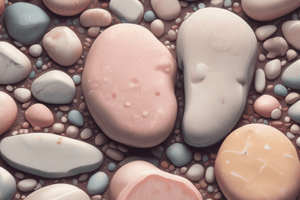Podcast
Questions and Answers
Which demographic group is more commonly affected by urinary stones?
Which demographic group is more commonly affected by urinary stones?
- Both men and women equally
- The text does not provide enough information
- Men (correct)
- Women
What is the prevalence of renal calculi in females?
What is the prevalence of renal calculi in females?
- 10.6%
- 7.1% (correct)
- 1.3 to 1
- The text does not provide enough information
Where can stones develop in the urinary tract?
Where can stones develop in the urinary tract?
- Bladder only
- Both kidneys and bladder (correct)
- The text does not provide enough information
- Kidney only
What factors favor the formation of stones in the urinary tract?
What factors favor the formation of stones in the urinary tract?
What substances can increase the risk of stone formation in the urinary tract?
What substances can increase the risk of stone formation in the urinary tract?
What is the most common type of stone in the urinary tract?
What is the most common type of stone in the urinary tract?
What can promote the precipitation of calcium and formation of stones in the urinary tract?
What can promote the precipitation of calcium and formation of stones in the urinary tract?
Which condition can cause hypercalcemia and hypercalciuria?
Which condition can cause hypercalcemia and hypercalciuria?
Which demographic group is experiencing increasing rates of renal calculi?
Which demographic group is experiencing increasing rates of renal calculi?
What is the male-to-female ratio of affected individuals with renal calculi?
What is the male-to-female ratio of affected individuals with renal calculi?
Which of the following tests may be part of the diagnostic workup for renal calculi?
Which of the following tests may be part of the diagnostic workup for renal calculi?
What can stone analysis determine?
What can stone analysis determine?
Which type of stone suggests a disturbance in uric acid metabolism?
Which type of stone suggests a disturbance in uric acid metabolism?
What do calcium oxalate or calcium phosphate stones usually indicate?
What do calcium oxalate or calcium phosphate stones usually indicate?
What is the purpose of obtaining dietary and medication histories and family history of renal calculi?
What is the purpose of obtaining dietary and medication histories and family history of renal calculi?
Which of the following is NOT a test mentioned in the text for the measurement of renal calculi?
Which of the following is NOT a test mentioned in the text for the measurement of renal calculi?
What can blood chemistries and a 24-hour urine test measure in the diagnostic workup for renal calculi?
What can blood chemistries and a 24-hour urine test measure in the diagnostic workup for renal calculi?
What is the purpose of carrying out chemical analysis on recovered stones?
What is the purpose of carrying out chemical analysis on recovered stones?
Which of the following disorders do urate stones suggest?
Which of the following disorders do urate stones suggest?
What can stone analysis provide a clear indication of?
What can stone analysis provide a clear indication of?
Which type of stones account for 72% of stones in men?
Which type of stones account for 72% of stones in men?
What is the most common type of stones diagnosed in women?
What is the most common type of stones diagnosed in women?
What are the predisposing factors for struvite stones?
What are the predisposing factors for struvite stones?
Which conditions can predispose patients to stone formation?
Which conditions can predispose patients to stone formation?
Which medications are known to cause stones in some patients?
Which medications are known to cause stones in some patients?
What are the clinical manifestations of stones in the urinary system?
What are the clinical manifestations of stones in the urinary system?
Where is the pain typically felt when stones are lodged in the renal pelvis?
Where is the pain typically felt when stones are lodged in the renal pelvis?
What is the term used to describe acute, excruciating, colicky pain caused by stones lodged in the ureter?
What is the term used to describe acute, excruciating, colicky pain caused by stones lodged in the ureter?
What is the size limit for stones that a patient is typically able to pass spontaneously?
What is the size limit for stones that a patient is typically able to pass spontaneously?
How is the diagnosis of urinary stones confirmed?
How is the diagnosis of urinary stones confirmed?




